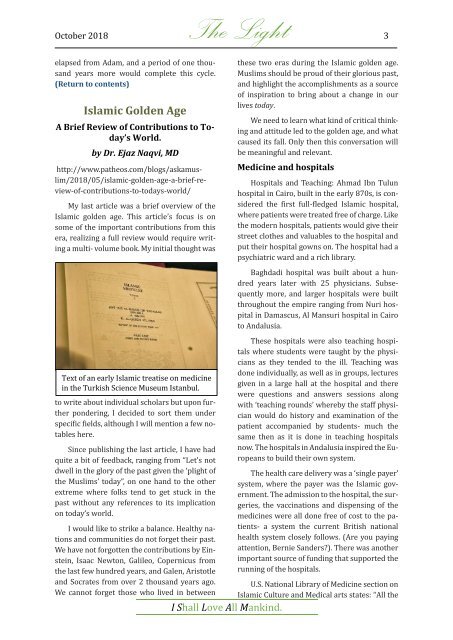The Light 2018 10 October
Representing the Lahore-Ahmadiyya Movement's interpretation of Islam as a peaceful, inclusive, rational, scientific and loving religion.
Representing the Lahore-Ahmadiyya Movement's interpretation of Islam as a peaceful, inclusive, rational, scientific and loving religion.
Create successful ePaper yourself
Turn your PDF publications into a flip-book with our unique Google optimized e-Paper software.
<strong>October</strong> <strong>2018</strong> <strong>The</strong><br />
<strong>Light</strong> 3<br />
elapsed from Adam, and a period of one thousand<br />
years more would complete this cycle.<br />
(Return to contents)<br />
Islamic Golden Age<br />
A Brief Review of Contributions to Today’s<br />
World.<br />
by Dr. Ejaz Naqvi, MD<br />
http://www.patheos.com/blogs/askamuslim/<strong>2018</strong>/05/islamic-golden-age-a-brief-review-of-contributions-to-todays-world/<br />
My last article was a brief overview of the<br />
Islamic golden age. This article’s focus is on<br />
some of the important contributions from this<br />
era, realizing a full review would require writing<br />
a multi- volume book. My initial thought was<br />
Text of an early Islamic treatise on medicine<br />
in the Turkish Science Museum Istanbul.<br />
to write about individual scholars but upon further<br />
pondering, I decided to sort them under<br />
specific fields, although I will mention a few notables<br />
here.<br />
Since publishing the last article, I have had<br />
quite a bit of feedback, ranging from “Let’s not<br />
dwell in the glory of the past given the ‘plight of<br />
the Muslims’ today”, on one hand to the other<br />
extreme where folks tend to get stuck in the<br />
past without any references to its implication<br />
on today’s world.<br />
I would like to strike a balance. Healthy nations<br />
and communities do not forget their past.<br />
We have not forgotten the contributions by Einstein,<br />
Isaac Newton, Galileo, Copernicus from<br />
the last few hundred years, and Galen, Aristotle<br />
and Socrates from over 2 thousand years ago.<br />
We cannot forget those who lived in between<br />
I Shall Love All Mankind.<br />
these two eras during the Islamic golden age.<br />
Muslims should be proud of their glorious past,<br />
and highlight the accomplishments as a source<br />
of inspiration to bring about a change in our<br />
lives today.<br />
We need to learn what kind of critical thinking<br />
and attitude led to the golden age, and what<br />
caused its fall. Only then this conversation will<br />
be meaningful and relevant.<br />
Medicine and hospitals<br />
Hospitals and Teaching: Ahmad Ibn Tulun<br />
hospital in Cairo, built in the early 870s, is considered<br />
the first full-fledged Islamic hospital,<br />
where patients were treated free of charge. Like<br />
the modern hospitals, patients would give their<br />
street clothes and valuables to the hospital and<br />
put their hospital gowns on. <strong>The</strong> hospital had a<br />
psychiatric ward and a rich library.<br />
Baghdadi hospital was built about a hundred<br />
years later with 25 physicians. Subsequently<br />
more, and larger hospitals were built<br />
throughout the empire ranging from Nuri hospital<br />
in Damascus, Al Mansuri hospital in Cairo<br />
to Andalusia.<br />
<strong>The</strong>se hospitals were also teaching hospitals<br />
where students were taught by the physicians<br />
as they tended to the ill. Teaching was<br />
done individually, as well as in groups, lectures<br />
given in a large hall at the hospital and there<br />
were questions and answers sessions along<br />
with ‘teaching rounds’ whereby the staff physician<br />
would do history and examination of the<br />
patient accompanied by students- much the<br />
same then as it is done in teaching hospitals<br />
now. <strong>The</strong> hospitals in Andalusia inspired the Europeans<br />
to build their own system.<br />
<strong>The</strong> health care delivery was a ‘single payer’<br />
system, where the payer was the Islamic government.<br />
<strong>The</strong> admission to the hospital, the surgeries,<br />
the vaccinations and dispensing of the<br />
medicines were all done free of cost to the patients-<br />
a system the current British national<br />
health system closely follows. (Are you paying<br />
attention, Bernie Sanders?). <strong>The</strong>re was another<br />
important source of funding that supported the<br />
running of the hospitals.<br />
U.S. National Library of Medicine section on<br />
Islamic Culture and Medical arts states: “All the














